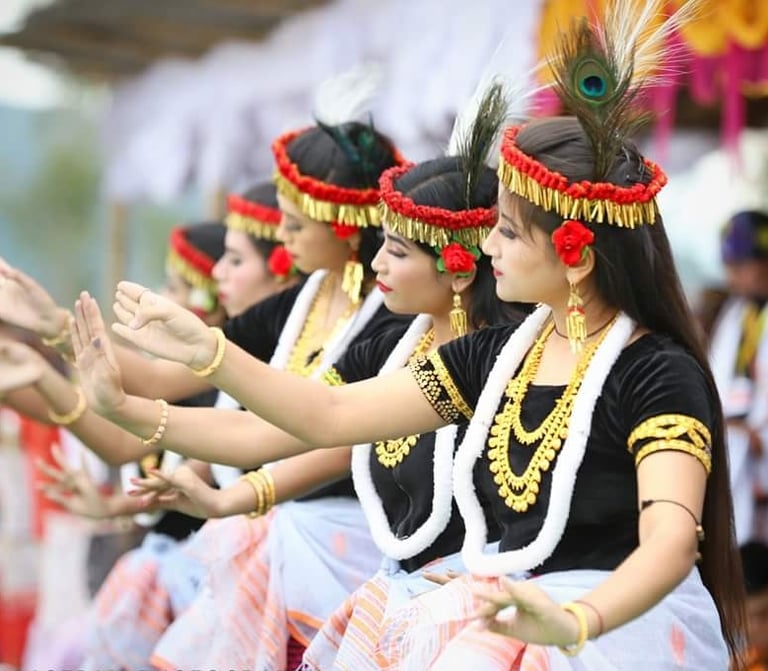Yek Salai: The Seven Clans and Surnames of Manipur
Introduction
Manipur, known in its ancient name as Kangleipak, is not only a land of scenic beauty but also a cradle of rich history, traditions, and cultural heritage. Among the defining elements of Meitei society is the concept of Yek Salai—the seven great clans that form the backbone of the Meitei (Meetei) community. Every Meitei family belongs to one of these clans, and within each clan are numerous Yumnaks (surnames) that define family identity and lineage.
Understanding the Yek Salai system is essential to appreciating the social organization, marriage customs, and ancestral traditions of Manipur.
Origins of Yek Salai
The Meiteis trace their ancestry to seven primordial lineages. Mythology holds that these clans originated from Pakhangba, the primordial ancestor, whose descendants ruled over different territories. Over centuries, these independent groups united under the Ningthouja (Mangang) dynasty to form the powerful Meitei kingdom.
Each Salai was once an ethnic group with its own dialect, king, and territory. Their unification marked the beginning of a collective Meitei identity.


The Seven Yek Salai (Clans)
The seven major clans are:
Mangang (Ningthouja) – The ruling dynasty of Manipur, most prominent in political history.
Luwang – Known for valor and warrior traditions.
Khuman – Once an independent and powerful kingdom before merging into the Meitei confederacy.
Angom – Renowned for scholarship, administration, and diplomacy.
Moirang (Moilang) – Famous for legends like Khamba-Thoibi, representing love and heroism.
Khaba Nganba (Kha Nganpa) – One of the ancient clans with rich historical significance.
Chenglei (Sarang Leishangthem) – Less in number today but equally significant in cultural heritage.
Salai and Yumnak (Surname)
Salai (Yek): Refers to the broader clan identity.
Yumnak (Sagei): Refers to specific surnames within each Salai.
For example, Luwang is a Salai, while surnames like Abujam, Achoibam, Nongpokpam, Hijam, Ningchitpam belong to this clan. Each Salai may consist of dozens of surnames—ranging from around 90 in Luwang to over 120 in Mangang.
Marriage Customs and Social Rules
One of the most important social principles tied to Salai is Yek Tinnaba—the prohibition of marriage within the same Salai.
This rule ensures exogamy, preventing intra-clan marriages.
It reinforces unity among different clans and preserves genealogical integrity.
Thus, when a marriage is arranged, one of the first considerations is the Salai and Yumnak of both individuals.
Cultural and Religious Significance
Beyond genealogy, the Yek Salai system has deep cultural meaning:
Each clan has its own ancestral deity worshipped during rituals and festivals.
In events like Umang Lai Haraoba (a ritual festival celebrating forest deities), clan participation is crucial.
Salai identity connects individuals to their past, reminding them of their ancestral roots and divine origins.
Examples of Surnames by Clan
While every Salai has numerous surnames, here are a few examples:
Mangang (Ningthouja): Khuraijam, Elangbam, Ningthoujam, Thokchom, Kangjam
Luwang: Abujam, Hijam, Nongpokpam, Achoibam
Khuman: Khuman, Thounaojam, Chingtham
Angom: Angom, Khaidem, Konthoujam
Moirang: Moirangthem, Thoidingjam, Khumanthem
Khaba Nganba: Khaba, Nganba, Khongbantabam
Chenglei: Sarangthem, Leishangthem
(Note: The complete list of surnames under each clan is vast and extends beyond these samples.)
Present-Day Relevance
Even in modern Manipur, Yek Salai remains an important marker of identity:
Marriage and Family Life: The rules of Yek Tinnaba are still observed by the Meitei community.
Cultural Events: Clan-based participation continues in Lai Haraoba and other rituals.
Genealogy and Pride: Families take pride in preserving their surnames, which serve as a living record of ancestral history.
Conclusion
The Yek Salai system is more than a genealogical classification—it is the very soul of Meitei identity. From its mythological beginnings to its role in marriage customs, rituals, and surnames, it connects present generations with their ancestors.
In a rapidly modernizing world, the preservation of this ancient system ensures that the people of Manipur continue to honor their roots while embracing the future.